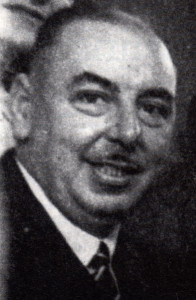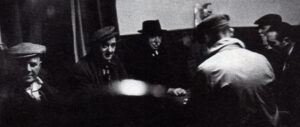
My Uncle Bill was six feet tall, had a voice like a trombone, a booming laugh that shook the rafters of the Crown Inn – and only one leg.
He stumped around the bar like Long John Silver, pouring sawdust from a sack into a row of cast iron spittoons under the plain wooden benches of the tap room, mopping the tiled floor each morning and throwing bucketfuls of water and bars of red carbolic soap into the drain of an open-air urinal across the inn yard.
Uncle Bill was 17 when he lost his leg. He was working in a Peak District quarry during one of the many controlled explosions that brought cliff-sides of brown and white limestone tumbling to the valley floor. A tiny, marble-sized piece of rock struck him on the shin one winter’s day in 1923 and crippled him for life.
During the 1930s he helped my grandfather run the Crown in the Derbyshire village of Dove Holes, which was then a nondescript collection of grey stone houses covered in lime dust together with six shops, four pubs, a church, a chapel and a cricket ground. Across the road from the Crown, in the shadow of a miniature Alpine landscape of mottled grey slag heaps – tips of waste lime known as ‘ess hills’ – lay the Bull Ring, a circular mound of closely-cropped grass that was formerly an ancient henge monument of stone slabs, all of which had been carted away by local farmers over the years.
The Crown was the quarrymen’s favourite inn. Whenever they finished their shift they would stamp through the front door wearing hob-nailed boots and ‘yorks’, leather-belted moleskin or corduroy trousers tied with string or a strap just below the knee. They were usually covered in a thin patina of white dust that was deposited in a trail along the passage as they walked towards the bar.
The bar was little more than a short side counter with a glass partition above it. There were no pump handles. Instead, beer was poured into glasses from a tall white jug that Uncle Bill frequently filled from wooden barrels in the cellar below.
Some of the quarrymen who frequented the inn worked long after retirement age. A good example was old George Naden, a stone filler with piercing blue eyes and a frothy white beard who was born in 1857 and was still working at the age of 74. Others included Jim Lomas, who acquired a reputation as the Dove Hole quarries’ strong man (“…the best I know with a No. 10 shovel,” said Uncle Bill) and Tom Fletcher, a cheery shunter employed in nearby Small Dale.

I often saw this group playing dominoes on the tap room table with my grandfather and old, whiskery Herbert Jennings, a Boer War veteran whose raucous coughing sometimes stopped play for long periods.
The Crown Inn was a wonderful play area whenever I visited my grandparents. I would crawl under the tap room benches pushing model cars or trains, throw darts at the big Plasticine-faced dartboard over the grate, chalk on the folding scoreboard or play with a skittles game in the corner – all this, of course, outside licensing hours.
When the quarrymen called I was confined to the inn’s cosy rear living room with its big cottage grate, velvet-covered table and heavy, ornate sideboard which always reminded me of a melanistic Taj Mahal.
On quiet mornings I accompanied my uncle down a flight of damp wooden steps into the cellar, and sometimes was invited to uncork a fresh barrel with blows from a stout hammer that hung on the whitewashed wall. As the dark, frothy liquid poured into the jug, and Uncle Bill chuckled as I struggled to hold it steady, there was a malty, yeasty smell which I seldom encounter in the pubs of today.
The Crown was an ale house, licensed only for the sale of beer. Bottles of lemonade and packets of crisps could also be purchased – and Player’s cigarettes, I seem to remember. Nevertheless, grandfather kept a few dark bottles on the top shelf of a cupboard in the living room. “What are they, Uncle Bill?” I once asked. “Don’t ask questions,” he replied mysteriously.
I noticed, however, that whenever the local police sergeant called at the inn my grandfather lifted down one of the bottles, poured some of its contents into a small glass and, whistling quietly through his teeth, gave it to the officer as he stood in a dark corner of the passage without his helmet and rocked gently on his heels.
There was a lot of shouting from the tap room most evenings and sometimes, despite his one leg, Uncle Bill could be seen helping a retching man out through the back door. On summer weekends a crowd of cricketers swarmed into the inn from the field across the road. There was even more shouting and carousing if the Dove Holes team had beaten the nearby village of Chapel-en-le-Frith, their arch-rivals in the High Peak League.
The Crown had a special front parlour known as the Ladies’ Room. This was occupied only on Sunday evenings when a few couples sat on leather-topped bench seats at iron claw-foot tables and listened to popular music played on an ancient upright piano in one corner. Occasionally the pianist was accompanied by a wild-eyed local wag who, fortified with a few pints of Bell’s Best Bitter, would use a couple of kitchen knives and an upturned biscuit tin as a kettle-drum. “He’s good, he should be in a band,” I once heard someone say, “Oh yes, a Band of Hope,” commented Uncle Bill with a guffaw.
The Buff Room was at the top of the stairs. The local branch of the Royal Antediluvian Order of Buffaloes, a friendly society sometimes unkindly referred to as “the poor man’s Masons” met here once a month and the door had a sliding panel that enabled members’ identities to be established before they entered.
In this room my brother and I were tucked up on Christmas Eve, although the excitement of Santa Claus’s imminent arrival and the carousing from the tap room below kept us awake well into the early hours.
Needless to say, when an adult was required to don a red robe and white whiskers for our Christmas Day dinner at grandma’s we all clamoured for Uncle Bill. He had spent many long, gruelling hours on his peg leg with the Crown’s noisy customers the previous night, but he made a smashing Father Christmas.
Peter Clowes








